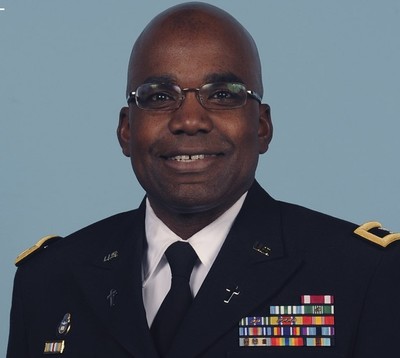Carrying Faith into War Zones: CFI Hosts National Guard Chaplain

During a frigid, mid-fourth century winter, a young Roman soldier named Martin of Tours encountered a cold beggar. Filled with compassion, Martin cut his cloak in two and gave half to the man to keep warm. That night, accounts say, Martin dreamed of Christ himself wearing the cloak and affirming his faith. The remaining cloak became a holy relic that kings in the Middle Ages carried into battle, and the name of the priest who took care of the cloak was called a cappellanu—the origin of the word “chaplain.”
Today, military chaplains continue to carry faith into war zones. On Veterans Day last week, Gordon’s Center for Faith and Inquiry hosted Rev. Dr. Paul Minor, a colonel and a chaplain of the Massachusetts Army National Guard and co-rector of All Saints Church in Belmont, MA. During his 23-year military career, Minor has deployed overseas in support of Operations Enduring Freedom and Iraqi Freedom. Though wartime looks drastically different than it did in Martin of Tours’ day, Minor still looks to the saint’s legacy.
In his virtual visit, Minor spoke about some of the challenges that military chaplains face as they bring the gospel beyond the walls of the church and the hope he finds in Scripture. Here are some takeaways from his message on Veteran’s Day:
Living out a commission in a place that doesn’t always want it. The National Guard is the militia of the states, with an oath to the constitution of the state and to the President. Authored by John Adams, the Massachusetts Constitution declares, “It is the right as well as the duty of all men in society, publicly, and at stated seasons to worship the Supreme Being, the great Creator and Preserver of the universe.” Despite the explicitly Christian language, Minor says, those joining the Army Guard often do not realize what they are technically swearing an oath to. “When I offer a worship service at our state headquarters on the training weekend, I have my team—a couple of enlisted religious affairs specialists and a couple of chaplain candidates—then maybe one or two other people join us for worship. John Adams would probably be disappointed with the turnout.”
Addressing faith in a secular environment. Of the 6,000 in the Army Guard, nearly 2,800 report no religious preference, 1,600 identify as Roman Catholic and no other religious group breaks 1,000. The top topics chaplains encounter in the Army Guard are their relationships, alcohol [use] and their military career. “They connect with chaplains, not presenting as ‘I’m coming to you, chaplain, because I want to know about the things of God.’ They are coming [because] they have these issues in their lives. So, how does the chaplain function as a religious leader in this environment?”
Boldly—but sensitively—talking about the core values of Christianity. “There are temptations . . . not to say so much about the cross or about sin. We don’t want to come off as Pharisees . . . [some] people have been hurt by their connections with the faith community; sometimes where they have defenses built up against religion.” The “core competencies” of chaplaincy are summarized in three responsibilities—to nurture the living, care for the wounded and honor the dead—and active faith is essential in all three. Minor says, “Maybe they’ve come [to talk] because their relationship issue, but it can turn on a dime to questions of meaning and purpose and questions of God . . . so we need to be able to be ready to engage when that happens.”
Learning from Daniel, Joshua and Timothy. Training chaplains and reflecting on his own career, Minor is both convicted and encouraged by examples from Scripture. As “people of God in an organization that’s not essentially focused on God,” Minor points to Daniel, a Hebrew in Nebuchadnezzar’s court. “The courage that’s needed is to remain a person of God, but also who’s sensitive and in tune with the culture of the organization.” He looks to Joshua, “whom God tells three times to be strong and courageous, and your God will go with you.” And he considers the encouragement Paul sent to Timothy “to persevere on the front lines of ministry. . . Paul says, ‘Don’t let anyone think less of you because you are young,’ and in the chaplaincy context [it’s] ‘Don’t let anyone think less of you because you don’t carry a weapon [or] because you don’t have rank on your hat. But you wear the cross of Christ.’”
 The Bell
The Bell